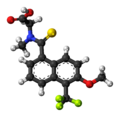Tolrestat
Tolrestat is a pharmaceutical drug that was developed for the management of diabetic complications, specifically diabetic neuropathy. Diabetic neuropathy is a common complication of diabetes, characterized by damage to the nerves due to prolonged high blood sugar levels. This condition can lead to various symptoms, including pain, numbness, and weakness, primarily in the hands and feet. Tolrestat belongs to a class of drugs known as aldose reductase inhibitors. By inhibiting the enzyme aldose reductase, Tolrestat aims to prevent or slow down the damage to peripheral nerves in patients with diabetes.
Mechanism of Action[edit]
Tolrestat works by inhibiting the enzyme aldose reductase, which plays a key role in the polyol pathway. In individuals with diabetes, high levels of glucose in the blood can lead to an increase in the activity of aldose reductase, converting glucose into sorbitol. Accumulation of sorbitol within nerve cells can lead to osmotic stress and subsequent nerve damage, contributing to the development of diabetic neuropathy. By inhibiting aldose reductase, Tolrestat reduces the accumulation of sorbitol in nerve cells, thereby potentially mitigating nerve damage and the progression of diabetic neuropathy.
Clinical Trials and Efficacy[edit]
Clinical trials of Tolrestat have evaluated its efficacy in managing symptoms of diabetic neuropathy. While some studies have shown positive outcomes in terms of symptom management and nerve function improvement, the overall efficacy of Tolrestat has been a subject of debate within the medical community. Concerns have been raised regarding the long-term benefits and safety profile of the drug, leading to further scrutiny and evaluation.
Safety and Side Effects[edit]
The use of Tolrestat has been associated with several side effects, ranging from mild to severe. Common side effects may include gastrointestinal disturbances, allergic reactions, and liver enzyme elevations. However, the most significant concern with Tolrestat has been its potential to cause hepatotoxicity, which is liver damage caused by chemical substances. Cases of severe liver damage and even fatalities have led to increased caution in the use of this drug.
Regulatory Status[edit]
Due to concerns over its safety profile, particularly the risk of hepatotoxicity, Tolrestat was withdrawn from the market in several countries and its clinical use has been limited. The regulatory status of Tolrestat varies by country, with some health authorities having imposed strict restrictions on its prescription and use.
Conclusion[edit]
Tolrestat represents an example of the challenges faced in the development and clinical use of drugs for the management of diabetic complications. While it offered a novel mechanism of action for addressing diabetic neuropathy, safety concerns have significantly limited its use. The case of Tolrestat underscores the importance of rigorous clinical testing and post-marketing surveillance to ensure the safety and efficacy of therapeutic agents.
-
Structure of Tolrestat
-
3D Ball Model of Tolrestat
Ad. Transform your life with W8MD's Budget GLP-1 injections from $75


W8MD offers a medical weight loss program to lose weight in Philadelphia. Our physician-supervised medical weight loss provides:
- Weight loss injections in NYC (generic and brand names):
- Zepbound / Mounjaro, Wegovy / Ozempic, Saxenda
- Most insurances accepted or discounted self-pay rates. We will obtain insurance prior authorizations if needed.
- Generic GLP1 weight loss injections from $75 for the starting dose.
- Also offer prescription weight loss medications including Phentermine, Qsymia, Diethylpropion, Contrave etc.
NYC weight loss doctor appointmentsNYC weight loss doctor appointments
Start your NYC weight loss journey today at our NYC medical weight loss and Philadelphia medical weight loss clinics.
- Call 718-946-5500 to lose weight in NYC or for medical weight loss in Philadelphia 215-676-2334.
- Tags:NYC medical weight loss, Philadelphia lose weight Zepbound NYC, Budget GLP1 weight loss injections, Wegovy Philadelphia, Wegovy NYC, Philadelphia medical weight loss, Brookly weight loss and Wegovy NYC
|
WikiMD's Wellness Encyclopedia |
| Let Food Be Thy Medicine Medicine Thy Food - Hippocrates |
Medical Disclaimer: WikiMD is not a substitute for professional medical advice. The information on WikiMD is provided as an information resource only, may be incorrect, outdated or misleading, and is not to be used or relied on for any diagnostic or treatment purposes. Please consult your health care provider before making any healthcare decisions or for guidance about a specific medical condition. WikiMD expressly disclaims responsibility, and shall have no liability, for any damages, loss, injury, or liability whatsoever suffered as a result of your reliance on the information contained in this site. By visiting this site you agree to the foregoing terms and conditions, which may from time to time be changed or supplemented by WikiMD. If you do not agree to the foregoing terms and conditions, you should not enter or use this site. See full disclaimer.
Credits:Most images are courtesy of Wikimedia commons, and templates, categories Wikipedia, licensed under CC BY SA or similar.
Translate this page: - East Asian
中文,
日本,
한국어,
South Asian
हिन्दी,
தமிழ்,
తెలుగు,
Urdu,
ಕನ್ನಡ,
Southeast Asian
Indonesian,
Vietnamese,
Thai,
မြန်မာဘာသာ,
বাংলা
European
español,
Deutsch,
français,
Greek,
português do Brasil,
polski,
română,
русский,
Nederlands,
norsk,
svenska,
suomi,
Italian
Middle Eastern & African
عربى,
Turkish,
Persian,
Hebrew,
Afrikaans,
isiZulu,
Kiswahili,
Other
Bulgarian,
Hungarian,
Czech,
Swedish,
മലയാളം,
मराठी,
ਪੰਜਾਬੀ,
ગુજરાતી,
Portuguese,
Ukrainian


